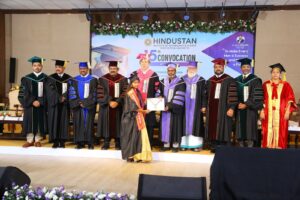Hindustan Institute of Technology and Science conducts 15th Convocation, 1600 students receive degrees
CHENNAI / September 14, 2024: The 15th Convocation of The Hindustan Institute of Technology and Science (HITS), held at Chennai, saw nearly 1,600 students from over 6 Schools and 150 programs receive UG, PG degrees and Ph.Ds in multiple streams including engineering, SLAAS, architecture, law, and management. Prizes were also awarded to 69 rank holders.
Sir Andre Konstantin Geim, the Nobel Prize winner renowned for his groundbreaking research in condensed matter physics, including the co-discovery of graphene, graced the event as the Chief Guest. Padma Bhushan Mr. Nambi Narayanan, Indian Aerospace Scientist, and Dr. P Veeramuthuvel, Project Director of Chandrayaan 3, ISRO, were Special Guests. The Convocation was presided over by HITS Chancellor, Dr. Anand Jacob Verghese.
An exclusive panel discussion was also held on the theme of Graphene Applications in Aerospace and Defence. Featuring Sir Andre Konstantin Geim, the event delved into the remarkable properties and vast applications of graphene, a material that is revolutionizing various industries from electronics to materials science.
Speaking at the Convocation, Sir Geim shared anecdotes from his own research journey, highlighting the challenges and rewards of pushing the boundaries of human knowledge. He encouraged the graduates to embrace a spirit of adventure, question the status quo, follow their passions with full determination and embrace the challenges and opportunities that lie ahead. Sir Andre Konstantin Geim said: “The collective future of humanity depends on our pursuit of new knowledge. As you embark on your career journey, be aware of the temptation to simply follow orders and stay within the confines of your job description. Too many brilliant minds have wasted their life this way, trapped in the comfort of routine. In those moments when we step outside our comfort zone and explore new ideas, we often find ourselves doing the most important things in our lives and careers.”
He added: “My most successful work in life happened when I took a step away from the routine and did some simple projects away from what I was mandated to do. Simply pouring water inside an electromagnet led me to the very first demonstration of magnetic levitation. Trying to replicate in a lab how geckos climb walls led me to a new type of dry adhesive that has become a hot research subject today. And I am not even a biologist! The experiment that got me the Nobel Prize started with a simple question: What if we keep dividing graphite into smaller and smaller parts till it could not be divided further? This simple curiosity led to the discovery of graphene, the thinnest material in the universe. So, it is through unexpected detours and endeavors and those moments where you dare to think differently that we make our most significant breakthroughs that could be the turning point of our careers.”
The University honored the outstanding achievements of Mr. Nambi Narayanan and Dr. P Veeramuthuvel by awarding them Doctor of Science (Honoris Causa). Mr. Nambi is a pioneer in liquid propulsion systems and launch vehicles. His work contributed significantly towards the success of rockets like Mangalyaan and Chandrayaan. Dr. P Veeramuthuvel, a project director at ISRO, led the Chandrayaan 3 mission to a successful soft landing on the moon.
Dr. P Veeramuthuvel recounted the various challenges faced in the quest to successfully put a lander on the moon and how these were overcome. He said: “With Chandrayaan-3, we achieved a perfect landing on the moon last year. There were many pains and failures before achieving this mission. Failure is bound to happen; we need to learn from our mistakes, continuously work on them, and come up with corrective actions. One of the important qualities everyone must develop is resilience. The second is team effort. Individually, you may be very successful, but organizations demand product outcomes that require multidisciplinary efforts. The third important aspect is testing. To gain confidence, we need thorough testing of our innovations to ensure their success. If you want to achieve significant accomplishments, you need to continuously strive for excellence. Whatever work you undertake, whether small or large, give your 100% to it.”
Mr. Nambi Narayanan narrated the journey and struggles of a small team of ISRO scientists developing a liquid-fueled rocket engine that powers many of India’s space launch missions today. “The lesson from the story of development of India’s Vikas engine is that, if you have passion and give your heart and soul to something, you will definitely succeed,” he said.
The Dr. K.C.G. Verghese, Founder Chairman Award for Best Research was conferred on Mr. Shiju Rawther, Ph.D. Scholar CSE. The Dr. (Mrs.) Elizabeth Verghese Founder Chancellor Award for best academic proficiency was presented to Mr. Devashish Sharma, B.Tech. Mechatronics. The Chancellor award for best outgoing student was bagged by Ms. Priyanka Michelle Michael, B.Arch.
Dr. Anand Jacob Verghese, Chancellor of HITS and Chairman of the Hindustan Group of Institutions, congratulated the graduates on their accomplishments. He encouraged them to strive to make a positive impact on the lives of others and use their knowledge and skills to create a brighter future for themselves and for generations to come.
Speaking at the panel discussion, Sir Andre Geim shared his insights on the future of graphene technology and its potential to transform aerospace and defence sectors. Several experts from the fields of aerospace, defence, and materials science discussed the latest developments in graphene research and its potential applications.
Prof. Rajeev Ahuja, Director of IIT Ropar served as the moderator of the panel discussion that included panelists like Dr. P. Veeramuthuvel, Project Director of Chandrayaan 3, ISRO; Dr. P.K. Jain, associate director, ARCI and Dr. Indrajit Shown, Professor, Department of Chemistry, Hindustan Institute of Technology and Science, Chennai.
The panelists explored the role of graphene and 2D materials in enhancing electronic devices, from ultra-fast transistors to flexible, wearable electronics, and the challenges associated with their commercial scalability. They addressed the application of 2D nanomaterials and their contributions to more sustainable energy solutions, reducing environmental impact. The panelists investigated the potential of graphene and 2D nanomaterials in aerospace applications, where the material’s lightweight yet strong properties can improve fuel efficiency, structural integrity, and thermal management in aircraft and spacecraft.



